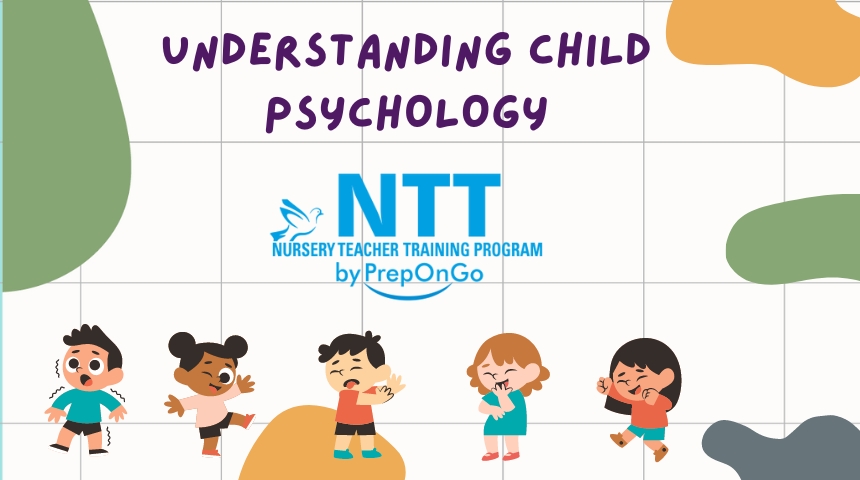Understanding Child Psychology

In the realm of early childhood education, understanding child psychology is crucial. For nursery teachers, grasping the fundamentals of how children think, feel, and behave is not just an advantage—it’s essential. By understanding child psychology, teachers can create more effective learning environments, address individual needs, and foster positive development in young children.
What is Child Psychology?
Child psychology is the study of the mental, emotional, and behavioral development of children from birth through adolescence. It encompasses various aspects, including cognitive development, social interaction, emotional regulation, and the impact of family and environment on a child’s growth.
Why is Child Psychology Important in Nursery Teacher Training?
Understanding child psychology enables nursery teachers to better comprehend the unique needs and behaviors of young children. This knowledge is critical for creating a supportive and nurturing learning environment where each child can thrive. Here’s why child psychology should be a core component of nursery teacher training:
- Tailored Learning Approaches
- Every child is unique, with different strengths, learning styles, and challenges. With a solid understanding of child psychology, nursery teachers can tailor their teaching methods to suit each child’s individual needs. This personalized approach helps maximize each child’s potential.
- Effective Behavior Management
- Young children often struggle with emotions and behaviors that they don’t fully understand. By studying child psychology, nursery teachers learn how to recognize the underlying causes of certain behaviors and how to address them in a constructive manner. This leads to a more harmonious classroom environment.
- Building Strong Emotional Connections
- Children learn best when they feel safe and emotionally connected to their teachers. Understanding child psychology helps teachers build these strong, trusting relationships, which are essential for a child’s emotional and social development.
- Supporting Cognitive Development
- Cognitive development in early childhood is a critical area of focus. Child psychology provides insights into how young minds develop, enabling teachers to design activities that stimulate cognitive growth and foster a love of learning from an early age.
- Enhancing Social Skills
- Social interaction is a key part of a child’s development. With a deep understanding of child psychology, nursery teachers can guide children in developing important social skills, such as sharing, empathy, and conflict resolution. This prepares them for future interactions both in and out of the classroom.
- Identifying Developmental Delays
- Early detection of developmental delays or challenges is vital for timely intervention. Nursery teachers with training in child psychology are better equipped to recognize signs of developmental issues and work with parents and specialists to address them.
Key Areas of Child Psychology in Nursery Teacher Training
To be effective in their roles, nursery teachers should focus on several key areas of child psychology during their training:
- Cognitive Development
- Understanding how children think, learn, and solve problems at different stages of development.
- Emotional Development
- Recognizing how children experience and express emotions and how these emotions affect their behavior and learning.
- Social Development
- Exploring how children interact with others, form relationships, and develop social skills.
- Language Development
- Examining how children acquire language and communication skills, and how these are linked to their overall development.
- Behavioral Psychology
- Understanding the reasons behind certain behaviors and learning how to manage them effectively in the classroom.
The Impact of Child Psychology on Nursery Education
Incorporating child psychology into nursery teacher training has a profound impact on both teachers and students. Teachers gain a deeper understanding of their students, allowing them to create more effective and compassionate learning environments. Children, in turn, benefit from a teaching approach that is attuned to their developmental needs, promoting healthier emotional, social, and cognitive growth.
Conclusion: The Role of Child Psychology in Nursery Teacher Training
Understanding child psychology is a key component of nursery teacher training that cannot be overlooked. By equipping teachers with knowledge of how children develop and learn, we ensure that they are prepared to meet the diverse needs of their students. This foundation not only enhances the quality of education but also supports the holistic development of every child, setting them up for success in their early years and beyond.
